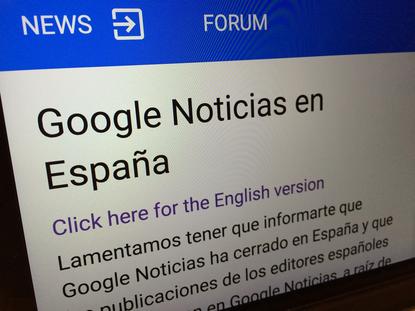Google may have to pay for news snippets under EU copyright reform
- 15 September, 2016 03:02

A proposed reform of European Union copyright law grants online news publishers additional rights that could lead to the closure of services such as Google News if strictly enforced.
Copyright law already provides reporters with protection for the news stories they publish, but in a draft directive published Wednesday the European Commission wants to create an additional, related right giving newspapers more powers to make news aggregators pay for using snippets consisting of, say, the headline and a sentence or two of each story.
News publishers say that in reusing such snippets without payment, aggregators like Google News are stealing their content. Meanwhile, the aggregators maintain that they are sending news websites additional traffic they can monetize.
Two EU countries have already tried what the Commission is proposing, and it didn't turn out well.
In Germany publishers decided not to charge Google for using their snippets rather than lose the traffic Google News brings them.
And in Spain, where a 2014 law gave publishers no option but to charge for republication of their snippets, Google simply closed down the local edition of Google News. It couldn't afford to pay for the snippets because it makes no money from the service, which carries no advertising, it said.
The Commission's latest proposal will hurt not just Google but also European startups trying to build a business on news aggregation, Google's vice president for global policy, Caroline Atkinson, wrote on the company's European public policy blog.
"Paying to display snippets is not a viable option for anyone," she wrote, implying that the company will respond across Europe as it did in Spain and Germany.
It's not just Google that dislikes the proposal.
The Mozilla Foundation's Chief Business and Legal Officer, Denelle Dixon-Thayer, called it "failed and harmful" in an email.
John Higgins, director general of industry group Digital Europe, warned: "This proposal appears to be sacrificing the next generation of young, innovative European creators in order to protect the interests of legacy media and their rigid business models."
And Joe McNamee, executive director of European Digital Rights (EDRi), a lobby group usually found on the opposite side of the online privacy debate to Google, described the proposal as poison for Europeans' free speech, for European business and for creativity. "It could not conceivably be worse," he said.
There was one piece of good news for those who feared the Commission would also introduce a so-called hyperlink tax: The additional protection envisaged for news sites "does not extend to acts of hyperlinking which do not constitute communication to the public," the draft directive noted.

